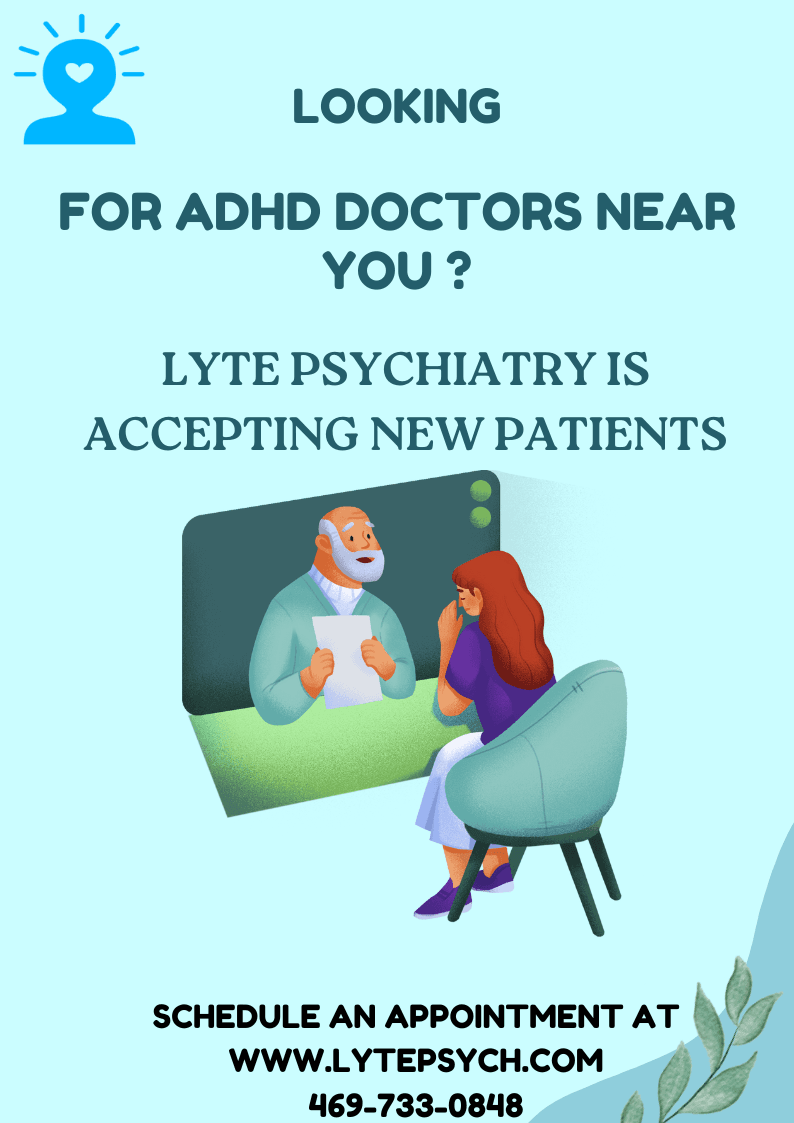Wed May 08 2024
Finding ADHD Doctors Near Me: A Step-By-Step Process a Guide from Lyte Psychiatry (Best Adults and Adolescents Psychiatrist and Therapist Near You), Affordable Therapist and Psychiatrist, Dallas, Fort Worth, TX

Finding ADHD Doctors Near Me: A Step-By-Step Guide from Lyte Psychiatry (Best Adults and Adolescents Psychiatrists and Therapists Near You)
Attention-Deficit/Hyperactivity Disorder (ADHD) is a neurodevelopmental disorder characterized by a persistent pattern of inattention and/or hyperactivity-impulsivity that interferes with functioning or development. Understanding the basics of ADHD is the first step toward effective management.
Common Symptoms of ADHD
Common symptoms include:
Inattention: Difficulty sustaining attention, lack of follow-through on tasks, and disorganization.
Hyperactivity: Excessive fidgeting, tapping, or talkativeness.
Recognize Types of ADHD
There are three primary subtypes of ADHD:
Predominantly Inattentive Presentation: Individuals mainly have symptoms of inattention and are easily distracted.
Predominantly Hyperactive-Impulsive Presentation: Characterized primarily by hyperactivity and impulsive behavior.
Combined Presentation: Symptoms of both inattention and hyperactivity/impulsivity are equally present
Why Specialized ADHD Care is Important
Specialized care is vital due to ADHD's complexity and its potential impact on academic, social, and occupational functioning. Experts suggest that targeted treatment reduces the risk of co-occurring conditions such as anxiety and depression, which the CDC notes occur in about 50% of adults with ADHD.
How to Find ADHD Doctors Near You A Guide from Specialist at Lyte Psychiatry
1. Research Methods
Start your search with these strategies:
Online Directories: Use medical directories such as the American Medical Association and specialty groups related to ADHD.
Referrals: Consult your primary healthcare provider or a school counselor who can provide referrals to reputed ADHD specialists.
2. Evaluating ADHD Clinics and Specialists
Consider the following when choosing a specialist:
Credentials and Experience: Check for certifications in behavioral neurology or psychiatry and experience in ADHD.
Reputation: Read patient reviews and testimonials to gauge satisfaction and success rates.
Preparing for Your First Visit What to Bring?
Comprehensive list of any symptoms, treatments tried, and any medications taken.
Important medical records and any previous ADHD assessments.
Questions to Ask Your Doctor
What are the treatment options available?
What should I expect in terms of improvement?
Treatment Options at Lyte Psychiatry
Medication Management: ADHD is commonly treated with stimulants, which have been found to be effective in about 70-80% of cases, according to the American Psychiatric Association.
Behavioral Therapy: Techniques such as cognitive behavioral therapy (CBT) are employed to manage behavior patterns.
Seek Professional Help and Diagnosis at Lyte Psychiatry
If you or someone you know is struggling with symptoms of ADHD, contact Lyte Psychiatry today for a comprehensive evaluation and personalized treatment plan. Our experienced professionals are here to help you understand your ADHD journey towards a more focused and balanced life.
FAQs
Q: Can adults be diagnosed with ADHD?
A: Yes, adults can and do get diagnosed with ADHD, sometimes as a continuation of childhood ADHD or as a new diagnosis.
Q: How effective is medication in treating ADHD?
A: Medication is effective for approximately 70-80% of individuals with ADHD.
Q: Are there any risks associated with ADHD medications?
A: Like all medications, those used to treat ADHD can have side effects, which should be closely monitored by a healthcare provider.
Q: How can behavioral therapy help with ADHD?
A: Behavioral therapy can help individuals develop strategies to manage their symptoms, improve organizational skills, and enhance their ability to focus and complete tasks.